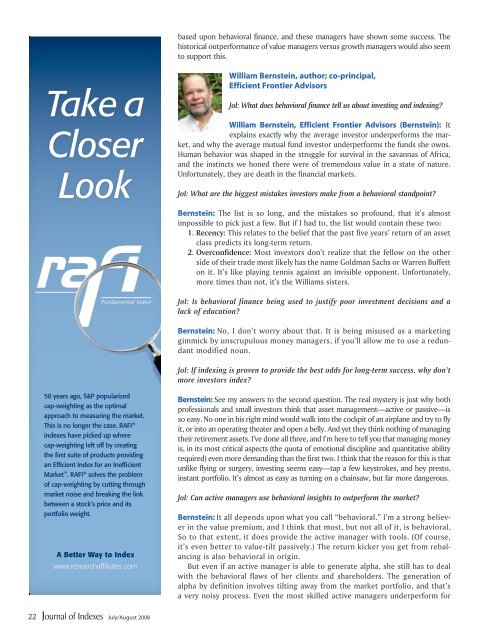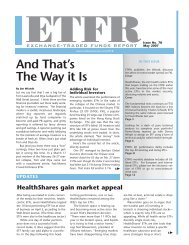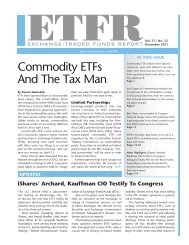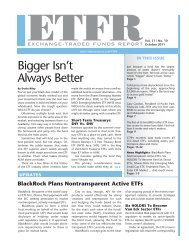Download - IndexUniverse.com
Download - IndexUniverse.com
Download - IndexUniverse.com
You also want an ePaper? Increase the reach of your titles
YUMPU automatically turns print PDFs into web optimized ePapers that Google loves.
ased upon behavioral finance, and these managers have shown some success. The<br />
historical outperformance of value managers versus growth managers would also seem<br />
to support this.<br />
Take a<br />
Closer<br />
Look<br />
William Bernstein, author; co-principal,<br />
Efficient Frontier Advisors<br />
JoI: What does behavioral finance tell us about investing and indexing?<br />
William Bernstein, Efficient Frontier Advisors (Bernstein): It<br />
explains exactly why the average investor underperforms the market,<br />
and why the average mutual fund investor underperforms the funds she owns.<br />
Human behavior was shaped in the struggle for survival in the savannas of Africa,<br />
and the instincts we honed there were of tremendous value in a state of nature.<br />
Unfortunately, they are death in the financial markets.<br />
JoI: What are the biggest mistakes investors make from a behavioral standpoint?<br />
Bernstein: The list is so long, and the mistakes so profound, that it’s almost<br />
impossible to pick just a few. But if I had to, the list would contain these two:<br />
1. Recency: This relates to the belief that the past five years’ return of an asset<br />
class predicts its long-term return.<br />
2. Overconfidence: Most investors don’t realize that the fellow on the other<br />
side of their trade most likely has the name Goldman Sachs or Warren Buffett<br />
on it. It’s like playing tennis against an invisible opponent. Unfortunately,<br />
more times than not, it’s the Williams sisters.<br />
Fundamental Index ®<br />
JoI: Is behavioral finance being used to justify poor investment decisions and a<br />
lack of education?<br />
Bernstein: No, I don’t worry about that. It is being misused as a marketing<br />
gimmick by unscrupulous money managers, if you’ll allow me to use a redundant<br />
modified noun.<br />
JoI: If indexing is proven to provide the best odds for long-term success, why don’t<br />
more investors index?<br />
50 years ago, S&P popularized<br />
cap-weighting as the optimal<br />
approach to measuring the market.<br />
This is no longer the case. RAFI ®<br />
indexes have picked up where<br />
cap-weighting left off by creating<br />
the first suite of products providing<br />
an Efficient Index for an Inefficient<br />
Market . RAFI ® solves the problem<br />
of cap-weighting by cutting through<br />
market noise and breaking the link<br />
between a stock’s price and its<br />
portfolio weight.<br />
A Better Way to Index<br />
www.researchaffiliates.<strong>com</strong><br />
Bernstein: See my answers to the second question. The real mystery is just why both<br />
professionals and small investors think that asset management—active or passive—is<br />
so easy. No one in his right mind would walk into the cockpit of an airplane and try to fly<br />
it, or into an operating theater and open a belly. And yet they think nothing of managing<br />
their retirement assets. I’ve done all three, and I’m here to tell you that managing money<br />
is, in its most critical aspects (the quota of emotional discipline and quantitative ability<br />
required) even more demanding than the first two. I think that the reason for this is that<br />
unlike flying or surgery, investing seems easy—tap a few keystrokes, and hey presto,<br />
instant portfolio. It’s almost as easy as turning on a chainsaw, but far more dangerous.<br />
JoI: Can active managers use behavioral insights to outperform the market?<br />
Bernstein: It all depends upon what you call “behavioral.” I’m a strong believer<br />
in the value premium, and I think that most, but not all of it, is behavioral.<br />
So to that extent, it does provide the active manager with tools. (Of course,<br />
it’s even better to value-tilt passively.) The return kicker you get from rebalancing<br />
is also behavioral in origin.<br />
But even if an active manager is able to generate alpha, she still has to deal<br />
with the behavioral flaws of her clients and shareholders. The generation of<br />
alpha by definition involves tilting away from the market portfolio, and that’s<br />
a very noisy process. Even the most skilled active managers underperform for<br />
22<br />
July/August 2008
















